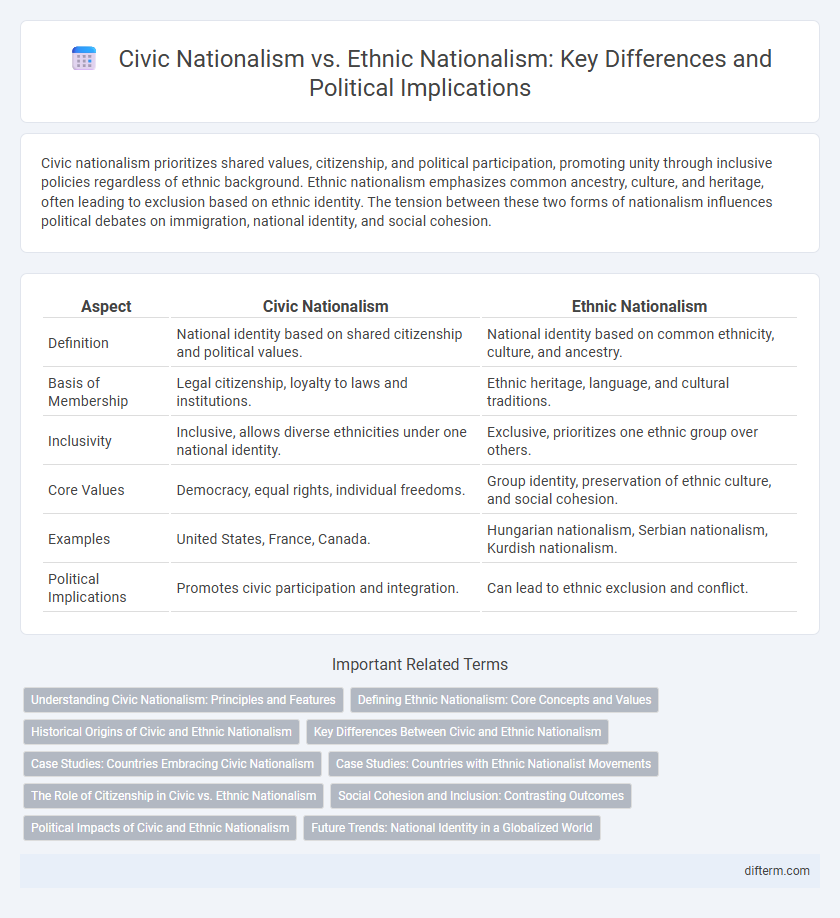Civic nationalism prioritizes shared values, citizenship, and political participation, promoting unity through inclusive policies regardless of ethnic background. Ethnic nationalism emphasizes common ancestry, culture, and heritage, often leading to exclusion based on ethnic identity. The tension between these two forms of nationalism influences political debates on immigration, national identity, and social cohesion.
Table of Comparison
| Aspect | Civic Nationalism | Ethnic Nationalism |
|---|---|---|
| Definition | National identity based on shared citizenship and political values. | National identity based on common ethnicity, culture, and ancestry. |
| Basis of Membership | Legal citizenship, loyalty to laws and institutions. | Ethnic heritage, language, and cultural traditions. |
| Inclusivity | Inclusive, allows diverse ethnicities under one national identity. | Exclusive, prioritizes one ethnic group over others. |
| Core Values | Democracy, equal rights, individual freedoms. | Group identity, preservation of ethnic culture, and social cohesion. |
| Examples | United States, France, Canada. | Hungarian nationalism, Serbian nationalism, Kurdish nationalism. |
| Political Implications | Promotes civic participation and integration. | Can lead to ethnic exclusion and conflict. |
Understanding Civic Nationalism: Principles and Features
Civic nationalism emphasizes shared values, citizenship, and political participation as the foundation of national identity, promoting inclusivity regardless of ethnic or cultural background. It prioritizes allegiance to democratic institutions, rule of law, and individual rights, fostering social cohesion through common civic responsibilities. This form of nationalism supports pluralism and multiculturalism, contrasting with ethnic nationalism's focus on ancestry, language, and cultural homogeneity.
Defining Ethnic Nationalism: Core Concepts and Values
Ethnic nationalism centers on shared ancestry, culture, language, and heritage as the primary criteria for national identity, emphasizing a homogenous group bound by common descent. This ideology prioritizes ethnic unity and cultural preservation, often linking political rights and community membership to ethnic lineage. Core values include allegiance to traditional customs, the protection of ethnic minority interests, and the belief that the nation-state should reflect one dominant ethnic group.
Historical Origins of Civic and Ethnic Nationalism
Civic nationalism originated during the Enlightenment, emphasizing shared citizenship, political rights, and allegiance to democratic institutions, particularly evident in the French Revolution of 1789. Ethnic nationalism emerged earlier in the 19th century, rooted in Romanticism and the idea of a common language, culture, and ancestry, as seen in the unification movements of Germany and Italy. The contrasting historical trajectories illustrate civic nationalism's basis in legal and political frameworks, while ethnic nationalism relies on cultural and ethnic identity as the foundation of nationhood.
Key Differences Between Civic and Ethnic Nationalism
Civic nationalism prioritizes inclusive citizenship based on shared laws and political values, while ethnic nationalism emphasizes common ancestry, culture, and language as the foundation of national identity. The key difference lies in civic nationalism's focus on political participation and individual rights irrespective of ethnicity, contrasted with ethnic nationalism's pursuit of ethnic homogeneity and preservation of cultural heritage. These distinctions impact policies on immigration, national unity, and social cohesion within diverse states.
Case Studies: Countries Embracing Civic Nationalism
Countries like Canada, India, and the United States exemplify civic nationalism by emphasizing shared values, inclusive citizenship, and multicultural integration over ethnic homogeneity. These nations prioritize legal frameworks, democratic participation, and individual rights as the foundation of national identity, fostering social cohesion amidst diversity. Case studies reveal that civic nationalism often leads to greater political stability and stronger institutions compared to ethnic nationalism.
Case Studies: Countries with Ethnic Nationalist Movements
Countries like Hungary and Russia exemplify ethnic nationalist movements, where national identity is deeply intertwined with shared heritage, language, and ethnicity. These movements often prioritize preserving cultural homogeneity and may resist multiculturalism or immigration policies perceived as threats to ethnic unity. Unlike civic nationalism, which centers on inclusive citizenship and political values, ethnic nationalism emphasizes ancestry and common ethnic origins as the foundation of national belonging.
The Role of Citizenship in Civic vs. Ethnic Nationalism
Citizenship in civic nationalism emphasizes inclusive legal membership based on shared values and political rights, fostering a unified national identity regardless of ethnic background. Ethnic nationalism links citizenship to ancestry, culture, and heritage, prioritizing ethnic homogeneity and exclusive belonging. The divergent roles of citizenship shape national policies on immigration, integration, and minority rights, influencing the stability and cohesion of multiethnic states.
Social Cohesion and Inclusion: Contrasting Outcomes
Civic nationalism fosters social cohesion by emphasizing shared values, citizenship rights, and inclusive participation regardless of ethnic background, promoting unity in diverse societies. Ethnic nationalism often prioritizes a common ancestry and cultural heritage, which can lead to exclusionary practices and social fragmentation among minority groups. These contrasting outcomes significantly influence national stability and the integration of multicultural populations.
Political Impacts of Civic and Ethnic Nationalism
Civic nationalism promotes inclusive citizenship based on shared political values and institutions, fostering social cohesion and democratic participation within diverse societies. Ethnic nationalism emphasizes common ancestry, language, or culture, often leading to exclusionary policies and increased intergroup tensions or conflicts. Political impacts of civic nationalism include stability and pluralism, whereas ethnic nationalism frequently correlates with segregation and nationalist-driven populism.
Future Trends: National Identity in a Globalized World
Civic nationalism emphasizes inclusive political values and shared citizenship, adapting more effectively to increased global migration and multicultural societies. Ethnic nationalism, rooted in ancestral heritage and cultural homogeneity, faces challenges as diverse populations demand recognition and rights. Future trends suggest a growing preference for civic models that balance national identity with global interconnectedness, fostering social cohesion amid cultural pluralism.
civic nationalism vs ethnic nationalism Infographic

 difterm.com
difterm.com